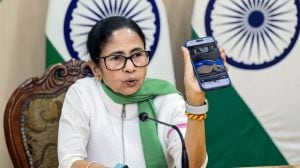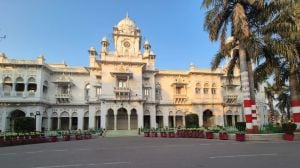The saffron riptide
The BJP is the architect of a political strategy that is perhaps unique in the annals of democratic politics. It makes apparent to onlook...

The BJP is the architect of a political strategy that is perhaps unique in the annals of democratic politics. It makes apparent to onlookers the worst that it is capable of, both in word and deed, and then demands gratitude for the fact that it does not fully carry out its designs.
It lets Sharma and Advani murderously sabre-rattle, so that we feel grateful for Vajpayee and Singh. It proposes a budget whose main claim to respectability is that it could have been worse.
It lays claim to being an acceptable political party not on any solid achievement, but on the thought that the consequences of not accepting it could be worse. Other political parties are judged on what they do. The BJP capitalises on the political slogan, 8220;We could do worse8221;.
In The Prince, Machiavelli describes how 8220;those who arrive at a principality through crimes,8221; can maximise their payoffs from them. He gives the following counsel: First demonstrate your capacity for cruelty. Then refrain from it so that people feelgrateful for your mercy. People will remember the relief the rulers provided, not the cruelty they inflicted.
Of course, as Machiavelli knew, this was at best an unstable synthesis. In order for the people to remain grateful for tender mercies, they had to be reminded that cruelty was an imminent possibility.
So it is with the BJP. It constantly has to demonstrate its destructive potential, so that we feel grateful for the moments of relief it provides.
Another way of putting the matter is that the BJP8217;s fanaticism is such that we feel grateful for its opportunism. Many had hoped that its opportunism 8212; the allure of power 8212; would temper its fanaticism and give its so-called moderates the upper hand.
For a while this strategy worked. The continuing centrist thrust of the electorate and the imperatives of finding coalition partners provided incentives for the BJP to jettison its militancy. It tried to transform itself from a political party that was associated with one of the most heinous subversionsof the authority of constitutional norms in independent India, to a party with a capacity to work by those norms.
There are many in the party, including the Prime Minister, who would like to continue on that path. But there are signs that the time for the BJP8217;s tender mercies is running out, and we should brace ourselves for its cruelties once again.
The nature of the BJP8217;s coalition partners, the slimness of its mandate in Parliament and the imperatives of staying in power will in the end exercise fewer restraints on the BJP than most suppose. For one thing, the BJP organisation itself has now, to a degree unprecedented in its own recent history, been taken over by the RSS, whose susceptibility to electoral considerations has always been a matter of some doubt.
In recent times both the RSS and the VHP have in effect been working at forcing the government8217;s hand on the Ayodhya issue. It is disingenuous of the Prime Minister to blame the opposition for keeping the issue alive when the designs of his owncadres grow clearer by the minute. Vajpayee may be sincere in his expression of regret over the demolition of the Babri Masjid and his solemn declaration that he will abide by judicial norms. But his sincerity is not the issue. His power to restrain his associates is.
The indecision of this government is an artefact of its own ideology, not its slim mandate. The VHP8217;s murderous attempts to regulate inter-faith marriages in Gujarat, the reconstitution of academic bodies like the Indian Council of Historical Research on dubious ideological grounds, the subversion of parliamentary norms like collective responsibility, the petulant attempt to make schoolgirls in Delhi the target of a cultural campaign, Manohar Joshi8217;s abominable behaviour on the Srikrishna Commission report 8212; these are merely the latest in the BJP8217;s continuing poisoning of Indian politics.
The government8217;s concessions to the information technology sector and the speedy resolution of Maruti8217;s affairs show fleeting glimpses of resolve. Butthese are scant compensations for the singularly unimaginative economic policy that will lead to more problems than are necessary. If the prime minister cannot, by personal example, stand up for core constitutional values, his power to do much else will remain a matter of grave doubt.
Another matter for concern should be the fact that the BJP is fast running out of ideas with which to consolidate its electoral base. The nuclear tests gave it a short-term boost but will not be of lasting electoral significance, its faltering economic policies are unlikely to turn the anti-incumbent sentiments of the Indian electorate around and the capacity of its allies to consolidate their regional bases remains in doubt.
This is a propitious opportunity for the militants in the party to make the case that since the BJP is not going to gain much ground anyway, it at least ought to take a chance with its agenda. The BJP has gone as far as it can on its small mercies and the incentives for its continuing to do so seemminuscule.
Watching and listening to the Shiv Sena, the RSS and the VHP, one cannot help feeling that they are getting restless. So far they are behaving more like school bullies, stamping their feet in impatience why they do not get their way. Their assault on the intellectual and artistic environment of this nation has already begun. Artists and intellectuals are being intimidated, the fascist Golwalkar is being installed in the pantheon alongside Gandhi, preparations are underway to once again make Ayodhya cast a long shadow over Indian politics.
Vajpayee, in the meantime, seems neither to have the resolve nor the power to stop them. One cannot remember any prime minister in recent memory who was as conspicuous by his absence as Vajpayee. He has surrounded himself with second-rate political operators and functionaries. Most leaders acquire more power with office; Vajpayee seems to have dissipated such power as he had. His rousing oratory has been reduced to a self-abasing whimper.
Vajpayee is doingvery well. What he always does well: ruminate. An epitaph for his reign as prime minister might be, For love of country he thought many a thought8217;. He cannot, it appears, prevent or mitigate the next round of the BJP8217;s cruelties.
The writer is Associate Professor of Government and Social Studies at Harvard University
- 01
- 02
- 03
- 04
- 05































